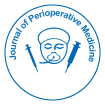
Journal of Perioperative Medicine
Open Access
ISSN: 2684-1290

ISSN: 2684-1290
Opinion Article - (2023)Volume 6, Issue 6
Perioperative medicine plays a pivotal role in enhancing patient outcomes by focusing on comprehensive care before, during, and after surgical procedures. The objective of perioperative medicine is to optimize patient health and reduce complications associated with surgery, ultimately leading to improved overall outcomes. This article explores the significance of perioperative medicine, its key components, and the positive impact it has on patient care.
Understanding perioperative medicine
Perioperative medicine is a relatively new and evolving field that recognizes surgery as a significant event in a patient's medical journey, rather than an isolated procedure. It aims to assess and manage a patient's health from the moment surgery is considered through the postoperative period, ensuring that the patient is in the best possible condition for surgery and that their recovery is smooth and complication-free.
Key components of perioperative medicine
Preoperative assessment: Before surgery, a thorough assessment of the patient's medical history, comorbidities, medications, and overall health is conducted. This evaluation helps identify potential risks and allows for the development of a personalized perioperative care plan. For instance, if a patient has uncontrolled diabetes, steps can be taken to stabilize blood sugar levels before surgery.
Risk stratification: Patients are stratified into risk categories based on their health status and the complexity of the surgery. This risk assessment helps in customizing the perioperative care plan to meet individual patient needs. High-risk patients may require more intensive monitoring and interventions.
Optimization of health:
Perioperative medicine focuses on optimizing a patient's health in the lead-up to surgery. This may involve lifestyle modifications, medication adjustments, or interventions to address specific medical conditions. For example, smoking cessation, exercise programs, and nutritional support can improve a patient's fitness for surgery.
Intraoperative care: During surgery, the perioperative team works closely to ensure patient safety. Anesthesia management, monitoring of vital signs, and coordination among surgical and anesthesia teams are significant for a successful outcome.
Postoperative care: The care continuum extends into the postoperative period, where close monitoring and management of pain, complications, and recovery are essential. Early detection and intervention can prevent potential complications and improve the patient's experience.
Benefits of perioperative medicine
Reduced Complications: By addressing underlying medical issues and optimizing health before surgery, the risk of complications during and after the procedure is significantly reduced. This leads to shorter hospital stays and faster recovery times.
Enhanced patient satisfaction: Patients who receive comprehensive perioperative care report higher levels of satisfaction with their surgical experience. They appreciate the attention to detail and the focus on their overall well-being.
Cost savings: While investing in perioperative medicine may seem like an added expense, it often results in cost savings in the long run. Fewer complications mean fewer hospital readmissions, additional surgeries, and extended hospital stays, ultimately reducing healthcare costs.
Improved long-term outcomes:
Optimizing a patient's health before surgery can have a lasting impact on their overall well-being. Patients are more likely to maintain healthy habits and manage chronic conditions after experiencing the benefits of perioperative care.
Consider the case of Mr. Smith, a 60-year-old patient scheduled for elective hip replacement surgery. Mr. Smith has a history of hypertension and type 2 diabetes, which were not well-controlled before his surgery was planned. Without perioperative medicine, he may have been at a higher risk of complications during and after the procedure.
However, Mr. Smith's surgical team recognized the importance of perioperative care. They conducted a thorough preoperative assessment and identified his uncontrolled diabetes as a significant concern. Through collaborative efforts with an endocrinologist, they optimized his blood sugar levels with medication and dietary modifications before the surgery.
During the operation, the anesthesia team carefully managed Mr. Smith's vital signs, and the surgical team successfully completed the hip replacement. Postoperatively, Mr. Smith received close monitoring, pain management, and physical therapy to facilitate his recovery.
The result Mr. Smith had a smooth recovery, experienced minimal pain, and was able to return to his daily activities sooner than expected. His diabetes remained well-controlled after surgery, leading to improved long-term health outcomes.
Perioperative medicine is a critical component of modern healthcare, emphasizing the comprehensive care of patients undergoing surgery. By addressing patients' health before, during, and after surgery, it significantly reduces complications, enhances patient satisfaction, and ultimately improves healthcare outcomes.
Citation: Avital Glasser (2023) Optimizing Patient Outcomes through Perioperative Medicine. J Perioper Med. 6:189.
Received: 01-Nov-2023, Manuscript No. JPME-23-26750; Editor assigned: 03-Nov-2023, Pre QC No. JPME-23-26750 (PQ); Reviewed: 17-Nov-2023, QC No. JPME-23-26750; Revised: 24-Nov-2023, Manuscript No. JPME-23-26750 (R); Published: 01-Dec-2023 , DOI: 10.35248/2684-1290.23.6.189
Copyright: © 2023 Glasser A. This is an open-access article distributed under the terms of the Creative Commons Attribution License, which permits unrestricted use, distribution, and reproduction in any medium, provided the original author and source are credited.